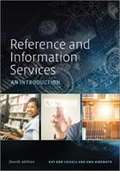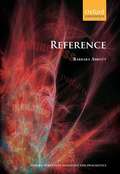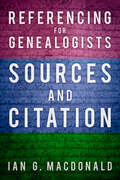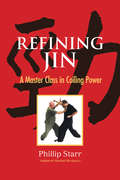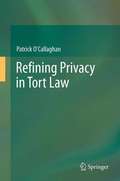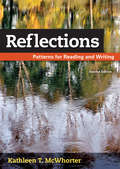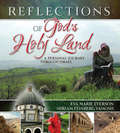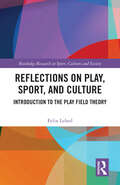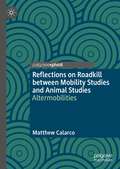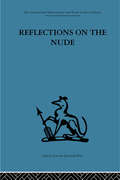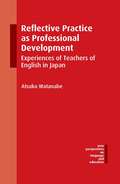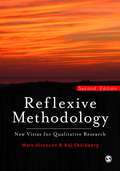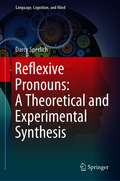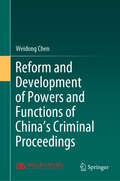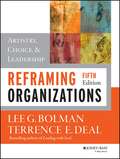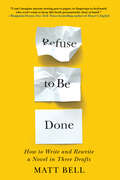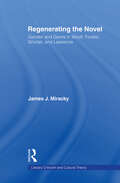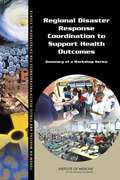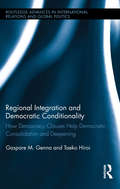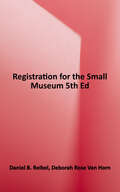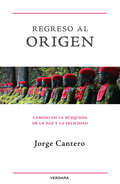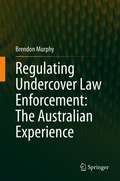- Table View
- List View
Reference Library of American Men, Volume 4 (Q-Z)
by Jennifer Mossman Bridget TraversA guide to reference library for all men in America.
Reference and Information Services: An Introduction
by Kay Ann Cassell Uma HiremathChapters on fundamental concepts, reference sources, topics provide a solid foundation; the text offers insight on core issues, including ethics, readers' advisory, information literacy, selecting and evaluating reference materials, assessing and improving reference services, guidance on conducting reference interviews with a range of different library users, and much more.
Reference: Oxford Surveys in Semantics and Pragmatics
by Barbara AbbottThis book introduces the most important problems of reference and considers the solutions that have been proposed to explain them. Reference is at the centre of debate among linguists and philosophers and, as Barbara Abbott shows, this has been the case for centuries. She begins by examining the basic issue of how far reference is a two place (words-world) or a three place (speakers-words-world) relation. She then discusses the main aspects of the field and the issues associated with them, including those concerning proper names; direct reference and individual concepts; the difference between referential and quantificational descriptions; pronouns and indexicality; concepts like definiteness and strength; and noun phrases in discourse. Professor Abbott writes with exceptional verve and wit. She presupposes no technical knowledge or background and presents issues and analyses from first principles, illustrating them at every stage with well-chosen examples. Her book is addressed in the first place to advanced undergraduate and graduate students in linguistics and philosophy of language, but it will also appeal to students and practitioners in computational linguistics, cognitive psychology, and anthropology. All will welcome the clarity this guide brings to a subject that continues to challenge the leading thinkers of the age.
Referencing for Genealogists: Sources and Citation
by Ian G. MacdonaldReliable genealogical conclusions depend on reliable data. Central to any good investigation is an appreciation of where the data came from, so that other investigators can re-examine it and re-establish the conclusions reached. Genealogy is little more than anecdote when the sources for facts are not cited and where clear references to sources are not given. Referencing for Genealogists will enable others to follow in your footsteps because it gives you the means to write clear, unambiguous references that provide solid support to the evidence you offer towards your conclusions. It is packed with examples that the reader can learn from and that also provide a treasure trove of sources invaluable to any genealogist.
Refining Jin: A Master Class in Coiling Power
by Phillip StarrA kung-fu champion explains the “coiling power” of Jin and how to subtly refine it for a more relaxed but explosive force, which can be used with multiple fighting and martial-arts styles Adding to the numerous basic exercises from his previous book, Developing Jin, Phillip Starr focuses on more advanced and subtle aspects of emitting the legendary “coiling power.” Starr explains this unique technique with straightforward ease, dozens of detailed photos, and the patience of a master teacher. This book is ideal for students interested in the martial-arts systems of baguazhang, taijiquan, and xingyiquan (or “coiling power”) who want to deepen their understanding and practice.
Refining Privacy in Tort Law
by Patrick O'CallaghanThis book is about privacy interests in English tort law. Despite the recent recognition of a misuse of private information tort, English law remains underdeveloped. The presence of gaps in the law can be explained, to some extent, by a failure on the part of courts and legal academics to reflect on the meaning of privacy. Through comparative, critical and historical analysis, this book seeks to refine our understanding of privacy by considering our shared experience of it. To this end, the book draws on the work of Norbert Elias and Karl Popper, among others, and compares the English law of privacy with the highly elaborate German law. In doing so, the book reaches the conclusion that an unfortunate consequence of the way English privacy law has developed is that it gives the impression that justice is only for the rich and famous. If English courts are to ensure equalitarian justice, the book argues that they must reflect on the value of privacy and explore the bounds of legal possibility.
Refining Privacy in Tort Law
by Patrick O'CallaghanThis book is about privacy interests in English tort law. Despite the recent recognition of a misuse of private information tort, English law remains underdeveloped. The presence of gaps in the law can be explained, to some extent, by a failure on the part of courts and legal academics to reflect on the meaning of privacy. Through comparative, critical and historical analysis, this book seeks to refine our understanding of privacy by considering our shared experience of it. To this end, the book draws on the work of Norbert Elias and Karl Popper, among others, and compares the English law of privacy with the highly elaborate German law. In doing so, the book reaches the conclusion that an unfortunate consequence of the way English privacy law has developed is that it gives the impression that justice is only for the rich and famous. If English courts are to ensure equalitarian justice, the book argues that they must reflect on the value of privacy and explore the bounds of legal possibility.
Reflections (Second Edition): Patterns for Reading and Writing
by Kathleen T. McwhorterThis innovative modes-based reader by reading expert Kathleen McWhorter supports an integrated approach to reading and writing with unique scaffolded instruction that guides students through comprehension, analysis, evaluation, and written response -- skills students will need to be successful in college. Compelling reading selections drawn from widely taught academic disciplines let students practice the work they're expected to do in other college courses. The second edition has been thoroughly revised with a new grammar handbook, expanded research coverage, new readings, and new features to provide stronger, more integrated reading and writing advice. Reflections can be packaged with LaunchPad Solo for Readers and Writers, allowing you to more efficiently track students' progress with reading, writing, and grammar skills in an active learning arc that complements the book.
Reflections of God's Holy Land
by Eva Marie EversonDiscover the origin of the Word of God, and the Land of His Heartbeat in Reflections of God's Holy Land: A Personal Journey Through Israel. This unique armchair tour of Israel includes four-color photographs, related scriptures, historical and archaeological information about each area, and a description of what it looks and feels like to be there today. Providing more than a coffee table book of slick photographs, authors Everson and Feinberg-Vamosh (one Christian, one Jewish) enlighten readers with a deeper understanding of the land of Israel-the land that holds not only God's story but the story of His people. Features include: Beautiful photographs with cross-referenced scriptures of 40 significant biblical locations Historical and archaeological comment and present-day perspective Endorsements:"You've always wanted to go to the Holy Land, and this book will only deepen that longing. If for any reason you can't go, Reflections of God's Holy Land is the next best thing. You'll feel as if you've been there. Don't miss this." -Jerry B. Jenkins, Novelist"If you've been to Israel, this book will feel like a return trip. I highly recommend you settle in with a cup of something and experience the beauty and inspiration of these pages! I love it!!" -Marilyn Meberg, Women of Faith® Speaker & Author
Reflections on Play, Sport, and Culture: Introduction to the Play Field Theory (Routledge Research in Sport, Culture and Society #141)
by Felix LebedThe psychological dependence of humanity on playing is huge. Its nature and functional utility are unclear. These linked yet contradictory issues have created the intrigue that has fed philosophical thought for more than two hundred years. During this period, philosophy transferred many of the subjects of its analysis to the aegis of the humanities that it spawned. Each of them pays close attention to human play and studies it with its own methods of theoretical and experimental research. Thus, what was once a general philosophical comprehension of human play has branched out into different directions, definitions, and theories. This new book represents a renewed general view of human play. The unique quality of the volume lies in its fairly rare interdisciplinary methodology, encompassing a broad spectrum of the humanities: philosophy, anthropology, sociology, and the history of play, and behavioral analysis of playing, which have been done by the author. As a result, the volume ends with the proposition of a new general approach to human play that is named by the author “play field theory”. Such an approach makes reflections on play, sport, and culture a source for all scholars studying play, by widening their knowledge through both a new general view and their familiarization with notions from neighboring fields and disciplines.
Reflections on Roadkill between Mobility Studies and Animal Studies: Altermobilities
by Matthew CalarcoRoadkill is a recurrent but often unthought feature of modern life. Yet, consideration of the broader significance of the myriad social, ethical, and political issues related to roadkill has largely gone missing from mainstream scholarship and activism. This neglect persists even in fields such as mobility studies and animal studies that would otherwise seem to have a vested interest in the topic. This book aims to bring roadkill to the foreground of current discussions among scholars and activists in these fields in order to demonstrate that roadkill is a uniquely important site from which to understand and contest the machinations of the dominant social order. It argues that a careful examination of roadkill can help both to uncover the hidden violence of contemporary human-centered systems of mobility and to develop alternative modes of mobility for a renewed social life in common with our more-than-human kin.
Reflections on the Nude (International Behavioural And Social Sciences Ser. #Vol. 100)
by Adrian StokesTavistock Press was established as a co-operative venture between the Tavistock Institute and Routledge & Kegan Paul (RKP) in the 1950s to produce a series of major contributions across the social sciences. This volume is part of a 2001 reissue of a selection of those important works which have since gone out of print, or are difficult to locate. Published by Routledge, 112 volumes in total are being brought together under the name The International Behavioural and Social Sciences Library: Classics from the Tavistock Press. Reproduced here in facsimile, this volume was originally published in 1967 and is available individually. The collection is also available in a number of themed mini-sets of between 5 and 13 volumes, or as a complete collection.
Reflective Practice as Professional Development: Experiences of Teachers of English in Japan
by Atsuko WatanabeThis book presents a researcher's work on reflective practice with a group of high school teachers of English in Japan. Beginning with a series of uncomfortable teacher training sessions delivered to unwilling participants, the book charts the author's development of new methods of engaging her participants and making use of their own experiences and knowledge. Both an in-depth examination of reflective practice in the context of Japanese cultural conventions and a narrative account of the researcher's reflexivity in her engagement with the study, the book introduces the concept of 'the reflective continuum' - a non-linear journey that mirrors the way reflection develops in unpredictable and individual ways.
Reflexive Methodology
by Mats Alvesson Kaj SköldbergPraise for the First Edition: 'Reflexive Methodology is a textbook indispensable to any young researcher. It does not tell its readers how to do research. It does something much more important: It shows how research has been done in the qualitative tradition, thus encouraging the readers to make their own choices' - Barbara Czarniawska, Goteborg University 'I would go so far as to argue that this book should be on the reading list of all social scientists and philosophers with an interest in the theory and practice of research' - Prometheus Reflexive Methodology established itself as a groundbreaking success, providing researchers with an invaluable guide to a central problem in research methodology - how to put field research and interpretations in perspective, paying attention to the interpretive, political and rhetorical nature of empirical research. Now thoroughly updated, the Second Edition includes a new chapter on positivism, social constructionism and critical realism, and offers new conclusions on the applications of methodology. It also provides further illustrations and updates that build on the acclaimed and successful first edition. Reflexivity is an essential part of the research process. In this book, Mats Alvesson and Kaj Skoldberg make explicit the links between techniques used in empirical research and different research traditions, giving a theoretically informed approach to qualitative research. The authors provide balanced reviews and critiques of the major schools of grounded theory, ethnography, hermeneutics, critical theory, postmodernism and poststructuralism, discourse analysis, genealogy and feminism. This book points the way to a more open-minded, creative interaction between theoretical frameworks and empirical research. It continues to be essential reading for students and researchers across the social sciences.
Reflexive Pronouns: A Theoretical and Experimental Synthesis (Language, Cognition, and Mind #8)
by Darcy SperlichThis book presents a comprehensive picture of reflexive pronouns from both a theoretical and experimental perspective, using the well-researched languages of English, German, Dutch, Chinese, Japanese and Korean. In order to understand the data from varying theoretical perspectives, the book considers selected syntactic and pragmatic analyses based on their current importance in the field. The volume consequently introduces the Emergentist Reflexivity Approach, which is a novel theoretical synthesis incorporating a sentence and pragmatic processor that accounts for reflexive pronoun behaviour in these six languages. Moreover, in support of this model a vast array of experimental literature is considered, including first and second language acquisition, bilingual, psycholinguistic, neurolinguistic and clinical studies. It is through both the intuitive and experimental data linguistic theorizing relies upon that brings out the strengths of the modelling adopted here, paving new avenues for future research. In sum, this volume unites a diverse array of the literature that currently sits largely divorced between the theoretical and experimental realms, and when put together a better understanding of reflexive pronouns under the auspices of the Emergentist Reflexivity Approach is forged.
Reform and Development of Powers and Functions of China's Criminal Proceedings
by Weidong ChenThis book addresses the basic theory of criminal procedure in China, together with recent reforms. Balancing the powers of public security and judicial organs with the rights of individual citizens, it assesses the nature of Chinese criminal proceedings. In the basic theoretical research section, the author, drawing on the latest findings from the legal community, systematically and comprehensively presents the current trends, main research topics and the main problems that should be explored in future research into criminal procedure law in China; further, the author explains the basic thinking behind the revision of criminal procedure law, and the allocation of judicial resources in criminal procedure and criminal justice. The policy, basic theory and operation problems of judicial power, procuratorial power, police power, defense power and judicial reform are subsequently explained and evaluated. The general writing style used is intentionally straightforward, making the book easily accessible for the readers. Based on the author’s substantial working experience in the area of criminal law, it offers a highly intuitive reading experience.
Reframing Organizations: Artistry, Choice, and Leadership
by Lee G. Bolman Terrance E. DealThoroughly updated, this fifth edition of the classic book outlines its four-frame model that examines organizations as factories, families, jungles, and theaters or temples: The Structural Frame: organize and structure groups and teams; The Human Resource Frame: tailor organizations to satisfy human needs, improve HRM, and build positive personal and group dynamics; The Political Frame: cope with power and conflict, build coalitions, hone political skills, and deal with politics; and The Symbolic Frame: shape a culture that gives purpose and meaning to work, stage organizational drama, and build team spirit.
Refuse to Be Done: How to Write and Rewrite a Novel in Three Drafts
by Matt BellThey say writing is rewriting. So why does the second part get such short shrift? Refuse To Be Done will guide you through every step of the novel writing process, from getting started on those first pages to the last tips for making your final draft even tighter and stronger. From lauded writer and teacher Matt Bell, Refuse to Be Done is encouraging and intensely practical, focusing always on specific rewriting tasks, techniques, and activities for every stage of the process. You won&’t find bromides here about the &“the writing Muse.&” Instead, Bell breaks down the writing process in three sections. In the first, Bell shares a bounty of tactics, all meant to push you through the initial conception and get words on the page. The second focuses on reworking the narrative through outlining, modeling, and rewriting. The third and final section offers a layered approach to polishing through a checklist of operations, breaking the daunting project of final revisions into many small, achievable tasks. Whether you are a first time novelist or a veteran writer, you will find an abundance of strategies here to help motivate you and shake up your revision process, allowing you to approach your work, day after day and month after month, with fresh eyes and sharp new tools.
Regenerating the Novel: Gender and Genre in Woolf, Forster, Sinclair, and Lawrence (Literary Criticism and Cultural Theory)
by James J. MirackyFirst Published in 2003. Routledge is an imprint of Taylor & Francis, an informa company.
Regional Disaster Response Coordination to Support Health Outcomes: Summary of a Workshop Series
by Megan ReeveWhen disaster strikes, it rarely impacts just one jurisdiction. Many catastrophic disaster plans include support from neighboring jurisdictions that likely will not be available in a regional disaster. Bringing multiple stakeholders together from sectors that do not routinely work with each other can augment a response to a disaster, but can also be extremely difficult because of the multi-disciplinary communication and coordination needed to ensure effective medical and public health response. As many communities within a region will have similar vulnerabilities, a logical step in planning is to establish responsibilities and capacities, and be able to work toward common goals to address all-hazards when the entire region is affected. To explore these considerations, the Institute of Medicine's Forum on Medical and Public Health Preparedness for Catastrophic Events organized a series of three regional workshops in 2014 to explore opportunities to strengthen the regional coordination required in response to a large scale multijurisdictional disaster. The purpose of each regional workshop was to discuss ways to strengthen coordination among multiple jurisdictions in various regions to ensure fair and equitable treatment of communities from all impacted areas. "Regional Disaster Response Coordination to Support Health Outcomes" summarizes the presentation and discussion of these workshops.
Regional Integration and Democratic Conditionality: How Democracy Clauses Help Democratic Consolidation and Deepening (Routledge Advances in International Relations and Global Politics #121)
by Gaspare M. Genna Taeko HiroiHow effective are democracy clauses of regional integration organizations (RIOs) in promoting democratization and democratic consolidation among member-states? RIOs are increasingly adopting "democracy only" clauses in their treaties, requiring democracy and political stability as a condition of membership. Stable democracy is a collective good for RIO members; without political stability, uncertainty regarding economic exchange increases, undermining the promise of integration. The presence of powerful countries may be necessary for the RIOs to legalize democratic conditionality. In this book, the authors argue that once established democracy clauses exert an independent influence in promoting and defending democratic norms and institutions within the member-states by increasing the transparency and credibility of democratic commitment and sanctions for violation. The findings based on the analysis of 40 RIOs around the world and in-depth analysis of the European Union, the Common Market of the South, and the Economic Community of West African States indicate that RIO democracy clauses help prevent democratic backsliding and coups and stimulate democratization and consolidation. With its global scope, originality, and theoretical rigor, this is the first book to catalogue democracy clauses adopted by RIOs worldwide with a thorough analysis of their effectiveness.
Registered Health Technician (RHIT) Exam Preparation, Fifth Edition
by Darcy Carter Patricia ShawThis book contains 550 multiple choice practice questions and two complete practice exams of 150 questions each that are organized by the RHIT domains.
Registration Methods for the Small Museum (American Association for State and Local History)
by Daniel B. Reibel Deborah Rose Van HornRegistration Methods for the Small Museum has been the definitive guide to registration methodology for small museums since 1978. The book covers all aspects of the registration process and provides practical solutions for the small museum professional in a concise, readable manner. This step-by-step guide begins with developing policy and takes the reader through acquisition, numbering, accessioning, documentation, loans, and deaccessioning. It is a great introduction to both manual and computer systems and can help those that are unfamiliar with museum registration systems learn more about their collections. The fifth edition updates the handbook to fit the registration systems in today’s small museums and provides additional forms that weren’t in previous editions of the book. <p><p>Features include: <p>•Easy to understand forms and templates <p>•Overviews of both manual and computer registration systems <p>•Overview of the acquisition process <p>•Overview of the cataloging process <p>•Overviews of museum loans <p>•Examples of a collections policy and registration manual for a small museum <p>•Guidance for small museums on how to create a new registration system or interpret the one they have
Regreso al origen: Camino en la búsqueda de la paz y la felicidad
by Jorge CanteroJorge Cantero funge como una guía en su segundo libro Regreso al origen. Haciendo una reflexión, que más bien parece una conversación entre amigos, el autor nos lleva de la mano en la búsqueda de los principio y su trascendencia, compasión respeto, felicidad son algunos valores en los que se sumerge de manera profunda para explicarnos la importancia de volver a ellos y continuar, para así poder tener una vida equilibrada. Regresar a los básicos y reencontrar la esperanza es el mensaje que se queda en nuestro interior al concluir de leer este libro. Ser felices y vivir en paz es aquello a lo que debemos atrevernos. “Salgan y reclamen su vida”.
Regulating Undercover Law Enforcement: The Australian Experience
by Brendon MurphyThis book examines the way in which undercover police investigation has come to be regulated in Australia. Drawing on documentary and doctrinal legal analysis, this book investigates how, in the space of a single decade, Australian law makers set out to regulate one of the most difficult aspects of police: undercover investigation. In so doing, the Australian experience represents a paradigm model. And yet despite its success, it is a system of law and practice that has a dark side – a model of investigation to relies heavily on activities that are unlawful in the absence of authorisation. It is a model that is as much concerned with the surveillance and control of police as it is with suspected criminal conduct.The book aims to locate the Australian experience in comparative perspective with other major common law jurisdictions (the United Kingdom, Canada and New Zealand), with a view to contrast strengths, similarities and weaknesses of these models. It is argued that the Australian model, at the pragmatic level, offers a highly successful model for regulatory structure and practice, providing a significant model for successful regulation. At the same time, the model that has been introduced raises important questions about how and why the Australian experience evolved in the way that it did, and the implications this has for the relationship between citizen and state, the judiciary and the executive, and broader questions about the protections offered by rights discourse and jurisprudence. This book aims to document the law, policy and practices that shape undercover investigations. In so doing, it aims to not only articulate the way in which the law regulates these activities, but also to move on to consider some of the fundamental questions linked to undercover investigations: how did regulation happen? By what means of regulation? What are the driving policy issues that give this field of law its particular complexion? What are the implications? Who gains, and who loses, by which means of power?The book offers unique insights into a largely unknown aspect of modern covert policing, identifying a range of practices, the legal framework, controversies and powers. By locating these practices in a rich theoretical context, informed by risk and governmentality scholarship, this book offers a legal and theoretical explanation of one of the most controversial forms of policing.

